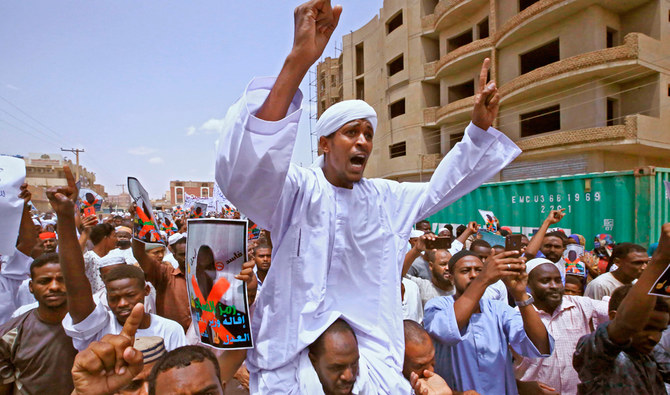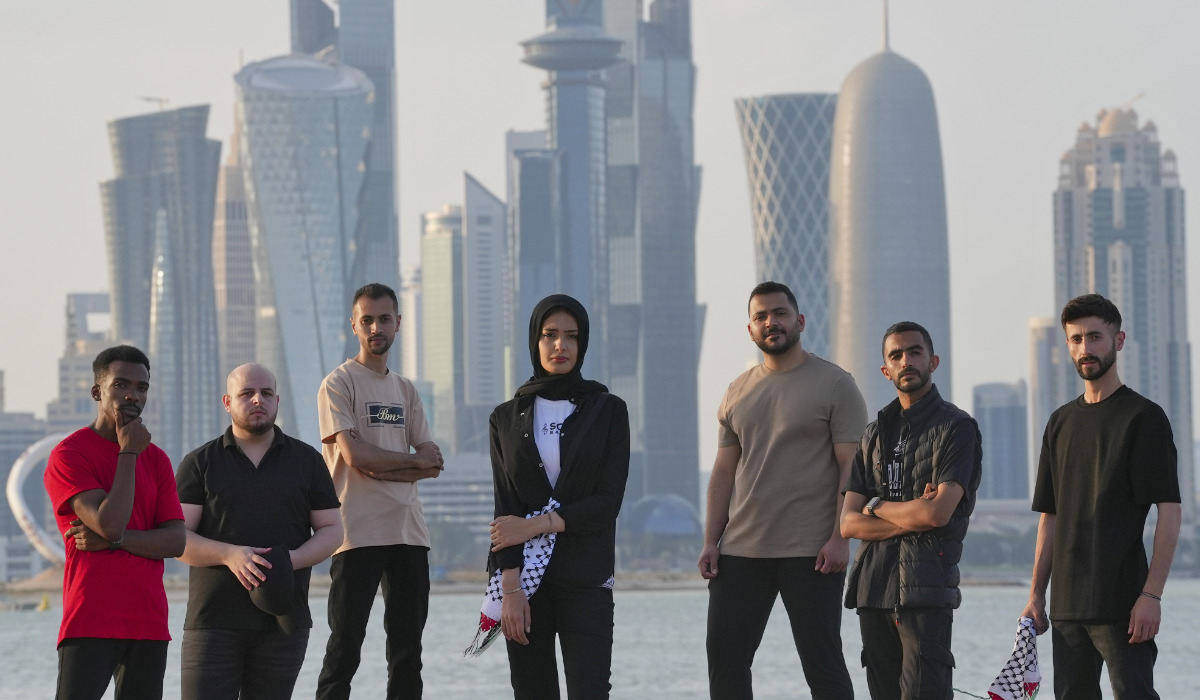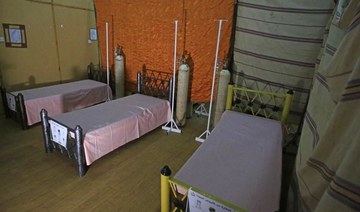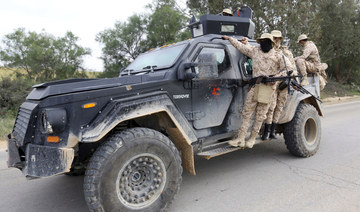KHARTOUM/AMMAN: Dozens of Sudanese protested in the capital Khartoum on Friday against recent government reforms they consider anti-Islamic, including allowing non-Muslims to drink alcohol, an AFP correspondent said.
Justice Minister Nasredeen Abdulbari said last Saturday that Muslim-majority Sudan now “allows non-Muslims to consume alcohol on the condition it doesn’t disturb the peace and they don’t do so in public.” He also said that converting from Islam to another religion would be decriminalized.
The announcements came a day after the country criminalized female genital mutilation.
Protesters took to the streets of Khartoum after prayers on Friday in the east and north of the capital, an AFP correspondent said.
They shouted slogans including, “God’s laws shall not be replaced” and carried banners reading “No to secularism.”
“Hamdok, Khartoum is not New York,” other protesters cried, addressing Prime Minister Abdalla Hamdok, who leads Sudan’s transitional government.
Late last month, Hamdok had pledged to announce decisions that “may have a major impact” in the country.
Security forces blocked streets in central Khartoum and bridges connecting the capital with its twin city of Omdurman, the AFP correspondent said.
Unprecedented popular protests that kicked off in Sudan in December 2018 led to the ousting of President Omar Bashir in April last year after 30 years in power and set the course for civilian rule. Extremists largely stayed on the sidelines of the nationwide demonstrations.
Under Bashir’s 30-year rule, the country adopted a more radical course of Islam, hosting Al-Qaeda founder Osama bin Laden between 1992 and 1996.
It also imposed punishments including flogging and sent jihadist volunteers to fight in the country’s civil war with the south Sudanese.
The US blacklisted Sudan as a state sponsor of terrorism, in a move that decimated the country’s economy.
Sudan’s transitional government, installed under a deal between protest leaders and the generals who took charge after Bashir’s ouster, has been pursuing a string of reforms, seeking to rebuild ties with the US, boost its international standing and rescue its ailing economy. A day earlier, activists hailed Sudan’s decision to lift the death penalty and flogging as punishment for gay sex. Others criticized the relaxation of the law in conservative Sudan, where a transitional government has promised to lead the country to democracy.
“These amendments are still not enough but they’re a great first step for the transitional government that’s trying to implement changes,” Noor Sultan, founder of Bedayaa, an LGBT+ group in Egypt and Sudan, said on Thursday. “We see this as a positive change on the path to reform.”
Sudan also decided to ban female genital mutilation, which typically involves the partial or total removal of the external genitalia of girls and women, and allow women to travel with their children without a permit from a male relative, he said.
Sultan said the government was discreet about dropping the death penalty for gay sex and its amendment document did not detail what Article 148 — the sodomy law — was about.
“I think society is still reluctant to accept such changes but I hope that the government will continue in its path toward reform,” she said.
Others criticized the Justice Ministry’s reform agenda.
Dozens protest against Sudan reforms
https://arab.news/rx4cz
Dozens protest against Sudan reforms

- Protesters took to the streets of Khartoum after prayers on Friday in the east and north of the capital
Tunisian police storm lawyers’ headquarters and arrest another lawyer

- Dozens of lawyers including Zagrouba gathered earlier on Monday in front of the courtroom, chanting slogans including: “What a shame, the lawyers and the judiciary are under siege”
TUNIS: Tunisian police stormed the bar association’s headquarters for the second time in two days and arrested a lawyer, witnesses said on Monday, after detaining two journalists as well as another lawyer critical of the president over the weekend.
A live broadcast on media website TUNMEDIA showed videos of broken glass doors and toppled chairs while the police arrested the lawyer Mahdi Zagrouba and other lawyers screamed in the background. Zagrouba is a prominent lawyer known for his opposition to President Kais Saied.
On Saturday, police stormed the building of the Tunisian Order of Lawyers and arrested Sonia Dahmani, a lawyer also known for her fierce criticism of Saied.
Dahmani had said on a television program last week that Tunisia was a country where life was not pleasant. She was commenting on a speech by Saied, who said there was a conspiracy to push thousands of undocumented migrants from Sub-Saharan countries to stay in Tunisia.
Some opposition parties described the storming of the lawyers’ building on the weekend as “a shock and major escalation,” and the bar association declared a nationwide strike.
Dozens of lawyers including Zagrouba gathered earlier on Monday in front of the courtroom, chanting slogans including: “What a shame, the lawyers and the judiciary are under siege.”
The Interior Ministry said in a statement that “the judicial decision against Zagrouba was due to his physical and verbal assault on two policemen today near the courtroom.”
Tunisia’s public prosecutor on Monday extended the detention of two journalists, Mourad Zghidi and Borhen Bsaiss, who were also on arrested on Saturday over radio comments and social media posts in a separate incident.
“It’s a horror scene... police entered in a showy manner and arrested Zagrouba and dragged him to the ground before some of them returned to smash the door glass,” said lawyer Kalthoum Kanou who was at the scene.
Saied took office following free elections in 2019, but two years later seized additional powers when he shut down the elected parliament and moved to rule by decree.
He also assumed authority over the judiciary, a step that the opposition called a coup.
UN says Gaza death toll still over 35,000 but not all bodies identified

- Haq said those figures were for identified bodies — 7,797 children, 4,959 women, 1,924 elderly, and 10,006 men — adding: “The Ministry of Health says that the documentation process of fully identifying details of the casualties is ongoing”
UNITED NATIONS/GENEVA: The death toll in the Gaza Strip from the Israel-Hamas war is still more than 35,000, but the enclave’s Ministry of Health has updated its breakdown of the fatalities, the United Nations said on Monday after Israel questioned a sudden change in numbers.
UN spokesperson Farhan Haq said the ministry’s figures — cited regularly by the UN its reporting on the seven-month-long conflict — now reflected a breakdown of the 24,686 deaths of “people who have been fully identified.”
“There’s about another 10,000 plus bodies who still have to be fully identified, and so then the details of those — which of those are children, which of those are women — that will be re-established once the full identification process is complete,” Haq told reporters in New York.
Israel last week questioned why the figures for the deaths of women and children has suddenly halved.
Haq said those figures were for identified bodies — 7,797 children, 4,959 women, 1,924 elderly, and 10,006 men — adding: “The Ministry of Health says that the documentation process of fully identifying details of the casualties is ongoing.”
Oren Marmorstein, spokesperson for Israel’s Ministry of Foreign Affairs, on Monday accused Palestinian militants Hamas of manipulating the numbers, saying: “They are not accurate and they do not reflect the reality on the ground.”
“The parroting of Hamas’ propaganda messages without the use of any verification process has proven time and again to be methodologically flawed and unprofessional,” he said in a social media post.
Haq said UN teams in Gaza were not able to independently verify the Gaza Ministry of Health (MoH) figures given the ongoing war and sheer number of fatalities.
“Unfortunately we have the sad experience of coordinating with the Ministry of Health on casualty figures every few years for large mass casualty incidents in Gaza, and in past times their figures have proven to be generally accurate,” Haq said.
The World Health Organization “has a long-standing cooperation with the MoH in Gaza and we can attest that MoH has good capacity in data collection/analysis and its previous reporting has been considered credible,” said WHO spokesperson Margaret Harris.
“Real numbers could be even higher,” she said.
Libya customs officers arrested over huge gold shipment

- The country is split between Abdelhamid Dbeibah’s UN-recognized government in Tripoli and a rival administration in the east, backed by strongman Khalifa Haftar
TRIPOLI: Libyan authorities have arrested several customs officials for attempting to traffic abroad about 26 tons of gold worth almost 1.8 billion euros ($1.9 billion), prosecutors said.
The Libyan prosecutor’s office did not detail the suspected origin of the massive amount of precious metal, greater than the national gold reserves of many countries.
Authorities in Misrata, western Libya, made the arrests related to the trafficking operation at the port city’s international airport, the office said Sunday night.
“The investigating authorities ordered the arrest of the director general of customs and customs officials at the international airport of Misrata,” it said in a statement released on Facebook.
The officials had attempted in December 2023 to traffic the gold bars weighing some 25,875 kilograms, currently worth almost 1.8 billion euros, the statement said.
Libyan law says only the central bank can export gold, said the office, which opened an investigation into the case in January.
Libya has been plagued by political instability and violence since the 2011 overthrow and killing of longtime dictator Muammar Qaddafi.
The country is split between Abdelhamid Dbeibah’s UN-recognized government in Tripoli and a rival administration in the east, backed by strongman Khalifa Haftar.
Misrata, east of the capital Tripoli, played a key role in fighting Qaddafi’s forces, as well as against the Daesh group’s fighters in 2016, and in battling against a failed offensive by Haftar’s forces against the capital Tripoli in 2019.
The US-based non-government group The Sentry, which investigates trafficking in conflict areas, said that chaos-torn Libya has become a key hub for illicit gold trafficking over the past decade.
“Particularly since 2014, Libya has been used as a transit area toward places such as the UAE and, to a lesser extent, Turkiye” for trafficking gold, according to report the group published last November.
“Two crucial points of transit are used to export gold on an illicit basis: the port and airports of the Misrata-Zliten-Khums area and those of Benghazi” in the east, the report said.
Five Iraqi soldiers killed in Daesh attack, sources say

- Iraq’s defense ministry issued a statement mourning the loss of Col. Khaled Nagi Wassak “along with a number of heroic fighters of the regiment as a result of their response to a terrorist attack”
BAGHDAD: An Iraqi commanding officer and four soldiers were killed and five others injured on Monday in an attack by suspected Daesh militants on an army post in eastern Iraq, two security sources said.
The attack took place between Diyala and Salahuddin provinces, a rural area that remains a hotbed of activity for militant cells years after Iraq declared final victory over the extremist group in 2017.
Iraq’s defense ministry issued a statement mourning the loss of a colonel and “a number of heroic fighters of the regiment as a result of their response to a terrorist attack.”
Security forces repelled the attack but there were many casualties in the process, the statement added.
Iraq has seen relative security stability in recent years after the chaos of the 2003-US-led invasion and years of bloody sectarian conflict that followed.
Baghdad is now looking to draw down the U.S-led international coalition that helped defeat Islamic State and remain in the country in an advisory role, saying local security forces can handle the threat themselves.
Palestinian band escapes horrors of war but members’ futures remain uncertain

- Israel has killed more than 35,000 people and leveled large swaths of Gaza
- The band — which formed in 2012 and plays both traditional Arabic songs and their own modern pop songs — has long served as a refuge for its members who grew up in Gaza amid grinding poverty and other hardships
DOHA, Qatar: They stroll Doha’s waterfront promenade and sing softly about children who are now “birds in heaven,” flying free of the pain of the war in Gaza.
For the Palestinian group Sol Band, it seems surreal that weeks ago they were hiding from Israeli shelling.
“I just want the war to end,” said Rahaf Shamaly, the band’s main vocalist and only woman. “I want to return to Gaza, walk and clean up its streets, hug my family, and sing with the band in the place where we started from.”

Five of the band’s seven musicians returned to Gaza in August to work on their next album.
“We had a lot of music and performances planned,” said Fares Anbar, the band’s percussionist.
But on Oct. 7, Hamas, along with other militants, attacked southern Israel, killing 1,200 people and taking 250 others hostage. Israel retaliated with a military campaign that has so far killed more than 35,000 people and leveled large swaths of Gaza.
In April, the five bandmates were able to leave Gaza via Egypt to Qatar.
The band — which formed in 2012 and plays both traditional Arabic songs and their own modern pop songs — has long served as a refuge for its members who grew up in Gaza amid grinding poverty and other hardships. Their home, a 360-square-kilometer (140-square-mile) enclave, has been blockaded for years by Egypt and Israel. Its population of 2.3 million Palestinians has suffered through previous rounds of war between Israel and Hamas, which has ruled the strip since 2007.
“Living under a siege, an occupation, and living through very difficult circumstances … music was my only escape since I was a child,” the band’s founder and percussionist, Said Fadel, said.
Music shaped Fadel’s life. His grandfather was one of the first percussionists in the area and his grandmother played the oud, a lute-like stringed musical instrument common in the Middle East and Africa.
Of Sol Band’s songs, “Raweq Wa Haddy,” or “Chill Down,” is their most famous. The lyrics that promise “great days coming back,” now seem a lifetime away for people who are moving from place to place, hiding from airstrikes.
After returning to Gaza in August to record, the five members of the band filmed themselves surviving the attacks and shared the videos online whenever an Internet connection allowed. Music remained their lifeline and their main hope; they created songs, often amid the rubble, with sounds of explosions in the background. They filmed music videos from where they sheltered, urging people not to lose hope and remain resilient in the face of adversity.
Some songs touched on those killed by Israeli airstrikes, particularly children.
“My children are birds in heaven, lucky is heaven to have them,” one song goes. “All my life I hoped to raise them and see them grow up before my eyes.”
In shelters and camps across Gaza, Sol Band’s five members held activities for displaced children to keep their minds off what was happening. Anbar, the band’s percussionist, even taught some how to keep a beat as a drummer.
They posted videos of themselves in tents, playing the guitar and drums, with smiling children who sang along.
“The children’s interaction with the music, and how they forgot everything that is happening around them … it proved to me the importance of music in our lives and the effect it has in the Gaza Strip,” he said.
The five band members who left Gaza via Egypt to Qatar had been scheduled to perform on the first stop of their tour “The Journey Begins” at a Palestinian culture festival in Doha. Though the band has achieved fame internationally, like other Palestinians they hold travel documents that often involve complicated requirements, and at times they face outright visa rejections.
“Our passports are Palestinian, (and our) birthplace Gaza,” Anbar said. “This made it very difficult for us to get visas.”
With pending shows in Belgium and Tunisia, there is little guarantee that they will make it there. And if their visa situation is not sorted out in Qatar, the five will eventually have to return to Gaza — and an uncertain future.
“Would the plans we had before the war still happen?” asked Hamada Nasrallah, a vocalist. “We have no clear answers.”






















